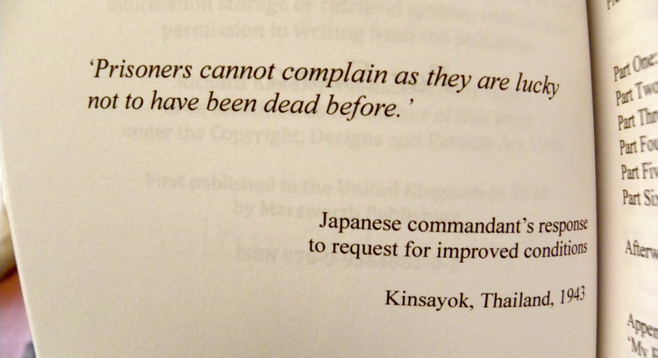Today's excerpt from
The Prisoner List
Cobham and Stock normally left the camp together; they crossed the pit at night using a bamboo pole, as they had at Tamuang. But they often returned at different times.
They had made their way back separately on the night that Adam Stock lost his grip on the bamboo. He fell straight down into the pit, breaking his leg as he hit the bottom. He was in agony. The walls of the pit were several feet high on each side and Stock was unable to move.
The patrolling Japanese sentry found him down there, with money passed to him by the local Thai sympathisers. There was no concern for his broken leg. Stock was transferred to the local Kempetai headquarters for questioning.
It is difficult to imagine how Stock could have been in worse trouble: he had broken out of the camp at night, which was seen as tantamount to attempting escape; he had been having dealings with people outside the camp, which was forbidden; he was obtaining money, which could be used to buy the prisoners influence with the locals – or even weapons; and he could collect more news by meeting Thai people and visiting them in their homes than he could ever have done with a radio hidden in his hut.
Adam Stock knew what to expect. He was savagely beaten and interrogated under torture.
How many times, they asked him, had he crossed the ditch? Did others go with him? How much money had he accumulated?
Where was the money kept? Who looked after it?
They had made their way back separately on the night that Adam Stock lost his grip on the bamboo. He fell straight down into the pit, breaking his leg as he hit the bottom. He was in agony. The walls of the pit were several feet high on each side and Stock was unable to move.
The patrolling Japanese sentry found him down there, with money passed to him by the local Thai sympathisers. There was no concern for his broken leg. Stock was transferred to the local Kempetai headquarters for questioning.
It is difficult to imagine how Stock could have been in worse trouble: he had broken out of the camp at night, which was seen as tantamount to attempting escape; he had been having dealings with people outside the camp, which was forbidden; he was obtaining money, which could be used to buy the prisoners influence with the locals – or even weapons; and he could collect more news by meeting Thai people and visiting them in their homes than he could ever have done with a radio hidden in his hut.
Adam Stock knew what to expect. He was savagely beaten and interrogated under torture.
How many times, they asked him, had he crossed the ditch? Did others go with him? How much money had he accumulated?
Where was the money kept? Who looked after it?


